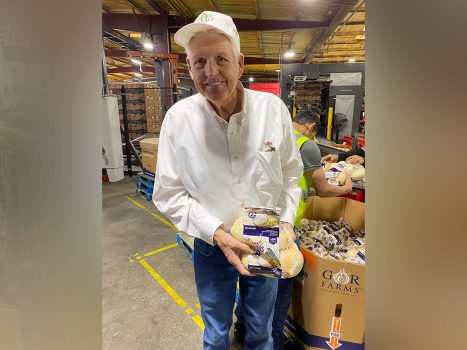Flexibility. That was what agribusiness Schuiling was mainly looking for in the packing of seed potatoes. Finding personnel was a problem and limited growth. A packing line from Eqraft solved this.
Shortly after World War 2, the entrepreneurial ‘Grandfather Schuiling’ started his first farm. The company expanded rapidly thanks to the acquisitions of several surrounding farms. ‘My grandfather was quite a visionary,’ says Wietze. He and his brother Gosse are now at the helm, the third generation. The progressive spirit is still there. After ventures into iceberg lettuce and even windmills, the focus is now mainly on arable farming. Gosse handles the onions, sugar beets, and wheat. Wietze is in charge of the potatoes. Seed potatoes, to be precise.
The company needs to be agile with these seed potatoes. Orders are relatively small, each with a different weight, packaging material, and potato variety. These orders mainly go to other arable farmers, who multiply the potatoes for consumption. Schuiling sells a lot to Agrico, a trading house for seed potatoes. Exporters are also on the client list. Automation is important in an agricultural business. For Schuiling’s seed potatoes, this automation first and foremost requires flexibility. The machines allow the company to adapt to market dynamics. Orders for jute bags of 25 and 50 kg (50 and 100 lbs) are the most common, but the packing line is also suitable for smaller bags and other materials.
To ensure this flexibility, Schuiling purchased two Eqraft machines: a combination scale and a Baxmatic. A major advantage for Wietze is that the machines are interconnected for communication, which is necessary in such a dynamic environment.
Automation is a priority
Father Schuiling encountered one problem that is still relevant in the company today: finding staff is challenging, especially year-round. Moreover, scaling up has become increasingly important in the modern agricultural industry. According to Wietze, staying competitive is difficult without automation. This played a key role in the choice of the Eqraft packing line. Whilst exploring machinery options, Schuiling already built a packing shed, in anticipation of the new line. Now, this is where the new equipment has been placed. Schuiling has just completed its first full harvest season with the new combination scale and the Baxmatic.
Get it right the first time
Choosing Eqraft aligns with the company’s philosophy: if you do something, get it right the first time. Also: be true to your word. Wietze says, ‘Eqraft is not the low-cost option, but in the end, it is a solid investment.’ He is also pleased with the company’s service. After all, every farm is different. In Wietze’s opinion, there are no ‘plug-and-play’ options. The exact settings of these machines have to be configured. Jute, for example, works differently than polypropylene, which is mainly used for consumer packs.
‘If you have a packing line like that, you just want to have it running without issues.’ Eqraft made sure of that. A good thing, because fellow farmers from the area regularly visit Schuiling to observe the machines in action. Schuiling and Eqraft considered the practical implementation of the packing line as well. The Baxmatic at Schuiling is placed slightly higher, to allow sufficient fall height for the 50 kg (100 lbs) bags. It is also possible to easily empty the packing line into a box. This allows for quick switching between orders with different potato varieties. After filling the bags, they’re off to the sewing lane where the bags are labeled and closed automatically. Subsequently, Symach takes care of palletizing and wrapping the potato bags.
The Eqraft equipment now operates at full capacity. After the first season, the settings for the Baxmatic have been fully optimized, and Wietze aims to process around 15 to 20 tons per hour. ‘An Eqraft like that can handle big volumes. That helps with our objective: to become more flexible in our business operations.’ Grandfather Schuiling would be proud.


